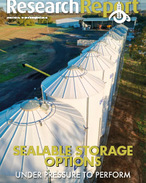This article is 2 years old. Images might not display.
In its latest cropping commodity overview Rural Bank said harvest has commenced several weeks earlier compared to last season.
It said climatic conditions in September, including frost, persistent dryness and high temperatures, has created many challenges for this season's crop.
While it is too early to get a good handle on the quality profile of this year's crop, Rural Bank said early results were showing "it is likely to be mixed due to the geographic spread and differing conditions across the country."
"Widespread frost early in the month has caused damage to cereal crops," it said.
"We won't fully understand the extent of the damage until we see harvest results."
The overview said dry conditions have spread further south on both the east coast and Western Australia, which had contibuted to pushing production estimates lower.
"Australian wheat production is estimated to fall within in the 23-25 million tonne range," Rural Bank said.
"Rainfall over the past week will help stabilise yields and shore up production in the upper end of that range."
PRICE UPDATE
Rural Bank said Australian wheat prices have dropped, despite declining yield prospects, due to softer international markets.
International wheat futures have fallen over the past month due to strong supply out of Russia, with Rural Bank reporting wheat futures also hit three-year lows late last month when data revealed United States' (US) wheat stockpiles were bigger than expected.
"These low prices have sparked some fresh demand with some significant sales of US made following the declines," Rural Bank said.
"Prices have since rallied 5 per cent off these lows indicating that US wheat is finally competitive at these values."
Australian barley prices peaked late last month following a strong run since China re-entered the Australian market, but Rural Bank said they have since dropped by four per cent due to waning international demand.
It said local canola values dropped by around 5.4 per cent on the back of abundant global supplies, with the European Union 2023-24 canola production revised 0.6 million tonnes higher to 19.5 million tonnes and strong selling pressure from Canadian growers also influencing prices.























